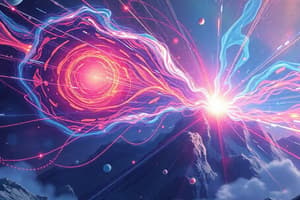Podcast
Questions and Answers
What is energy?
What is energy?
- The speed of an object
- The ability to do work (correct)
- A push or pull
- The energy of motion
What results when a force causes an object to move?
What results when a force causes an object to move?
Work
What is a force?
What is a force?
A push or pull
What is potential energy?
What is potential energy?
What is kinetic energy?
What is kinetic energy?
Mechanical energy is equal to the sum of _____ and _____ energy.
Mechanical energy is equal to the sum of _____ and _____ energy.
What does speed depend on?
What does speed depend on?
What is acceleration?
What is acceleration?
What does energy transformation refer to?
What does energy transformation refer to?
The law of conservation of energy states that energy can be created.
The law of conservation of energy states that energy can be created.
What is energy transfer?
What is energy transfer?
What is a wave?
What is a wave?
What is thermal energy?
What is thermal energy?
What kind of energy does a compound have that changes as its atoms rearrange?
What kind of energy does a compound have that changes as its atoms rearrange?
What is electrical energy?
What is electrical energy?
What causes sound energy?
What causes sound energy?
What is light energy?
What is light energy?
What is nuclear energy?
What is nuclear energy?
Which of the following is NOT a form of energy?
Which of the following is NOT a form of energy?
Flashcards are hidden until you start studying
Study Notes
Energy Concepts
- Energy: Fundamental ability to perform work.
- Work: Occurs when a force moves an object in its direction; involves force and displacement.
- Force: A vector quantity defined by a push or pull, characterized by magnitude and direction.
Types of Energy
- Potential Energy: Energy stored due to an object's position or shape; can be gravitational or elastic.
- Kinetic Energy: Energy of a moving object; depends on mass and speed.
- Mechanical Energy: Combined total of kinetic and potential energy in an object (KE + PE = ME).
Motion and Rates
- Speed/Velocity: Speed is how fast an object moves, depending on distance and time. Velocity includes direction.
- Acceleration: Indicates the rate of change of velocity; positive acceleration speeds up, negative slows down.
Energy Dynamics
- Energy Transformation: The process of changing energy from one form to another (e.g., potential to kinetic).
- Conservation of Energy: Principle stating energy cannot be created or destroyed, only transformed or transferred.
- Energy Transfer: Movement of energy from one object to another, facilitating work or change.
Energy Types and Examples
- Wave Energy: Energy transmitted by disturbances, such as sound and light waves.
- Thermal Energy: Total energy of particles in an object, relates to temperature.
- Chemical Energy: Energy stored in chemical bonds; released during chemical reactions; a type of potential energy.
- Electrical Energy: Energy resulting from the movement of electric charges.
- Sound Energy: Produced by vibrations of an object, traveling as waves.
- Light Energy: Generated from vibrations of electrically charged particles; enables vision.
- Nuclear Energy: Energy from nuclear reactions, involving changes in an atom's nucleus.
Summary of Energy Forms
- Thermal: Related to particle motion and temperature.
- Chemical: Potential energy in molecular bonds, changes during reactions.
- Electrical: Involves charged particles and currents.
- Sound: Energy from vibrating objects.
- Light: Energy from vibrating charged particles.
- Nuclear: Energy from atomic nucleus changes.
Studying That Suits You
Use AI to generate personalized quizzes and flashcards to suit your learning preferences.




